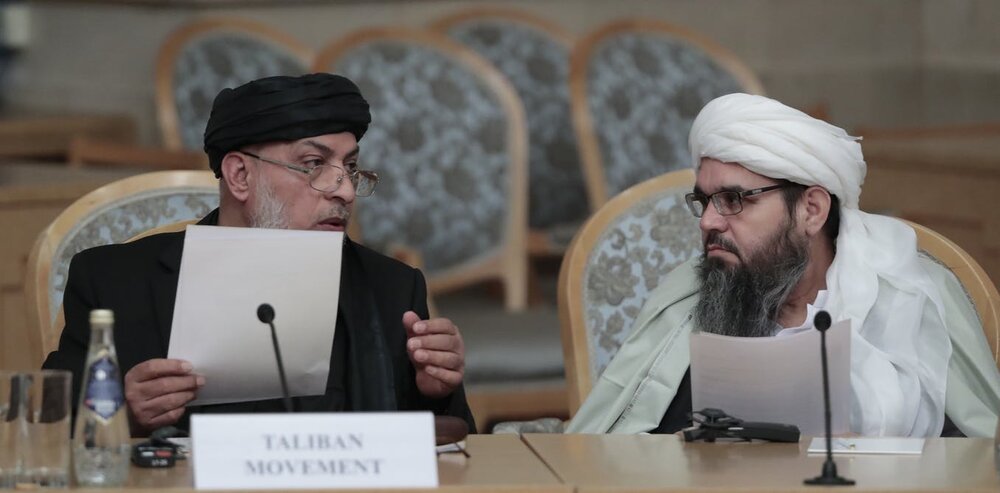In Doha talks, Taliban call for withdrawal of foreign forces from Afghanistan

TEHRAN - Hectic negotiations are underway between a delegation of the Afghan Taliban and U.S. officials in Doha to hammer out a solution to the protracted Afghan war.
While the U.S. team is led by special envoy Zalmai Khalilzad, the Taliban delegation is headed by Qatar bureau chief Sher Abbas Stanikzai. Taliban deputy chief Mullah Baradar is also participating in the talks.
The two sides have held several rounds of negotiations in Qatar, UAE and Pakistan over the past many months even with no let-up in violence across the country.
According to sources, there are many points of disagreement between the two sides at this stage, particularly on the issue of the complete withdrawal of foreign forces from the war-ravaged country.
A senior member of the group was quoting saying in media that they expect the ongoing negotiations to lead to the drawdown of all foreign forces from Afghanistan, allowing Afghans to peacefully negotiate an end to years of hostilities.
After two days of intense deliberations starting Tuesday, the two sides took two-day break and resumed talks on Saturday. The pause was meant to conduct ‘internal deliberations’ and seek opinion of their respective leaderships, said reports.
On Tuesday and Wednesday, a source said, discussions mainly revolved around drawdown of U.S.-led foreign forces and the nature of this withdrawal, also the assurance of Taliban to prevent insurgents from using Afghan soil to carry out attacks inside or outside the country.
“When the (American) occupation ends, I think we will have a countrywide consultation with scholars and influential Afghans about the shape of a future government,” Taliban delegation’s spokesperson Suhail Shaheen was quoted as saying by VOA.
Both sides are hoping to come up with a ‘draft agreement’ following the conclusion of talks.
Ashraf Ghani-led government in Kabul has been sidelined by both the U.S. officials and the Afghan Taliban, which has angered the president and his aides ahead of general elections in the country.
Ghani, who has been calling for Afghan-led and Afghan-owned peace process, has on many occasions expressed unhappiness over the manner in which his government has been undermined by those holding ‘talks’ about the country’s future.
His coalition partner and chief executive Friday said the Taliban should not ‘miscalculate the situation’, while calling for ‘intra-Afghan talks to ensure lasting peace’.
Even many Afghan analysts have questioned the credibility of these talks between the Taliban and U.S. “The U.S. talking to the Taliban with the Afghan people and government shut out is hardly ‘Afghan peace talks’, tweeted Rohullah Yakobi, a fellow of Human Security Center.
Meanwhile, on the eve of the latest round of Afghan peace talks in Doha, Taliban suicide bombers ambushed a military base in southern Afghanistan’s Helmand province on Friday, killing at least 35 Afghan soldiers.
The unremitting violence amidst ‘peace talks’ has come under scrutiny with people questioning the wisdom of U.S. officials who are blatantly turning blind eye to bloodshed in the country. The talks and violence, they say, cannot go hand in hand.
“Is this a new U.S. strategy: ignore the brazen and deadly attacks by those with whom they are negotiating with in order to secure a deal,” asked one Twitter user.
Another issue that has been gaining momentum is the non-inclusion of women in ongoing ‘peace talks’.
“The ‘peace’ talks are meaningless unless they are not inclusive and unless women don’t have a voice in these negotiations,” women’s rights activist Samira Hamidi told Tehran Times, adding that women in Afghanistan cannot be taken for granted anymore.
According to reports, the next round of talks between the two sides is likely to be held in Islamabad. Pakistan, which enjoys leverage over the insurgent group, played a key role in facilitating Doha talks, according to the country’s premier Imran Khan.
Leave a Comment